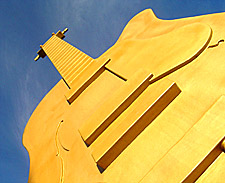Christians in Tamworth are leading the charge to welcome Sudanese refugees to the famous NSW town.
Several churches have played a key role in encouraging the local council to overturn last month's controversial decision not to accept the refugees. They are now going one step further, taking the initiative with strategies to sponsor and support the displaced Sudanese.
 The rural township " normally known as the country music capital of Australia " made worldwide headlines for all the wrong reasons in December when the Council refused an offer to be part of the Federal Government's humanitarian resettlement program for a group of Sudanese refugees.
The rural township " normally known as the country music capital of Australia " made worldwide headlines for all the wrong reasons in December when the Council refused an offer to be part of the Federal Government's humanitarian resettlement program for a group of Sudanese refugees.
The government had proposed that five Sudanese families be relocated to the town to start a new life after leaving their war-torn country. Thanks largely to pressure from local Christians, the Council has since modified its original decision and has undertaken a pilot program, subject to more resources from the government. There is now no commitment to numbers or time frames.
The case has attracted global interest, with the world's media focusing on issues of possible racism that have surfaced. However, the Rev Ken Fenton, senior minister in the Anglican parish of Tamworth South, says there are even more important theological issues at stake.
"Do people believe the world is owned by God, or by them?" Mr Fenton asks. "The Bible has a lot to say to this issue. Many Australians think they have a right to this land, but that's not the picture that the Bible paints.
"It's not rocket science; it's right there in Genesis 1. God is the Creator and this is his world. We're merely God's grateful tenants. We have to approach the issue humbly, because the Bible tells us that Australia does not merely belong to us by right."
Mr Fenton believes Christians have also been motivated by the knowledge that "the Creator has placed his stamp on every human', and by knowing that God himself is other-person centred in reaching out to humanity by sending his Son.
"While people across the community have been concerned, it is Christian people from our churches who have been right at the front on this," he says.
"We have been called "do-gooders', but we know Jesus commended the Samaritan for crossing cultural boundaries to help. There are clear gospel principles here."
Mr Fenton describes the council's decision to explore a pilot program as a "conditional embracing' of the plan, and says the issue is not yet resolved. "Do we celebrate? Or is it just procrastination? The next few weeks will be very interesting," he says.
With the Council's current plan conditional upon community groups taking the initiative, Christians continue to investigate how they can assist refugees. Areas of potential help will include finding schools for children, helping with language, and providing accommodation and employment.
Even before the current controversy, Christians in Tamworth have a proven track record of helping those in need.
Local churches had established a "family reunion fund' to help re-unite Sudanese refugees already in Tamworth with their loved ones. With contributions from churches, individuals and a local school, $8000 has been raised. Four Sudanese refugees from Uganda will arrive in Australia in February.
Over 20 years ago, a number of church-sponsored refugees from Laos came to the town. Coming from a Buddhist background, a number began to attend church and came to Christ.
Mr Fenton says the process was "a real success story'.
"People know places where re-settlement has created problems. Much depends on how the community embraces the newcomers. Under God, we believe the challenges are not insurmountable. Tamworth can provide good refuge for refugees."
Photograph by Rae Allen























